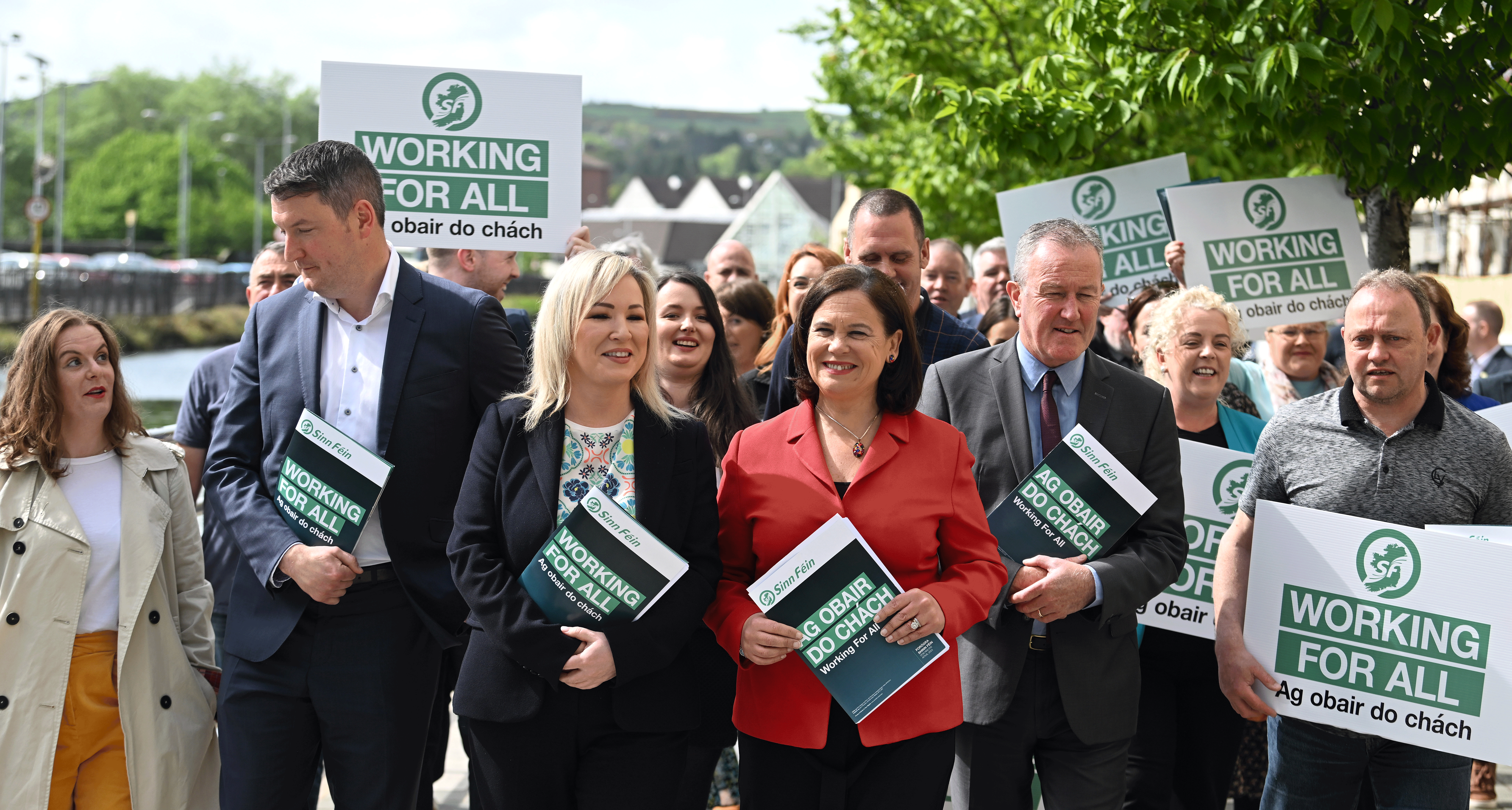On Saturday, Sinn Fein’s Northern Ireland leader, Michelle O’Neill, made headlines when she attended the Coronation alongside other political leaders from Ulster.
As the party launched its local government manifesto yesterday, the would-be Stormont First Minister insisted going to Westminster Abbey was ‘the right thing to do’, despite the disapproving reaction of some Irish republicans. She believes that her gesture will win over voters ahead of the council election on May 18 and claims that she is providing leadership ‘for all’ the people of Northern Ireland.
More revealing still was the comment from the party’s president, Mary-Lou McDonald:
‘Michelle’s attendance, Sinn Fein’s attendance at the Coronation, was a mark of recognition and respect for our Unionist citizens, for British people who are British now in a partitioned Ireland, and who will be British in the United Ireland.’
At last year’s Northern Ireland’s Assembly election Sinn Fein came top, despite its inextricable links to the IRA, whose ‘army council’ is still believed to direct the republican movement.
In the normal course of events, it would have had the right to nominate the First Minister, but this time the Democratic Unionist Party refused to reconstitute a power-sharing executive. In Northern Ireland, both the biggest unionist and the biggest nationalist parties have an effective veto on devolved government. The DUP insisted that it was merely continuing its protest against the Northern Ireland Protocol, which created a commercial and legal border between the province and the rest of the UK. Its first minister, Paul Givan, had resigned and collapsed the executive in February 2022, three months before Sinn Fein’s successful election, when his party was still the largest at Stormont.
Nevertheless, many of the DUP’s opponents – and even some unionists – suggested the party was now more interested in avoiding a republican first minister than opposing an Irish Sea frontier.
For that reason, Sinn Fein has launched something of a charm offensive, in an attempt to prove that it is acting reasonably and inclusively, while the DUP is bent on frustrating democracy. This was the republican party’s message at its manifesto launch yesterday, as it largely ignored council issues and appealed instead to voters to ‘re-endorse’ last May’s Assembly result.
You don’t have to be an arch cynic to suspect that O’Neill’s ‘generosity’ at the Coronation was therefore an electoral ploy, designed to give her party a pre-ballot boost and put unionists in an awkward position.
After all, the day after their leader was filmed seemingly relishing the Royal pageantry in London, Sinn Fein representatives celebrated the exploits of eight so-called IRA ‘volunteers’ in Loughall in 1987. These hardened terrorists, whom republicans depict as martyrs, were killed by the SAS as they tried to launch a bomb and gun attack on a police station in the County Armagh village.
In fact, it is Sinn Fein’s insistence on glorifying and justifying IRA crimes like this that forms the biggest obstacle to improving community relationships in Northern Ireland.
The party knows that very well. And Sinn Fein’s medium-term goal was always to cast the UK state as the main aggressor in the Troubles, while it portrayed the IRA as defending the beleaguered nationalist community.
Now, its glorifications of terrorist violence, and its unapologetic eulogies for murderers and bombers, are alternated cleverly with seemingly more conciliatory gestures. The aim is to provoke unionist outrage, while, at the same time, making it appear that Sinn Fein is involved in acts of reconciliation that are not being reciprocated.
The party’s deeper motivations are hinted at in Mary-Lou McDonald’s statement, which notably implies that a ‘united Ireland’ is an inevitable outcome.
For a long-time Irish nationalists, and Sinn Fein in particular, have tried to claim that equality or ‘parity of esteem’ demanded that symbols and institutions of the Irish republic should have the same status as their British equivalents in Northern Ireland. If unionists quite properly refuse to confuse issues of sovereignty and identity, expect Sinn Fein to foster fresh grievances among their potential supporters, on the basis that the party’s generosity at the Coronation was spurned.
Similarly, the language about ‘our unionist citizens’, who are ‘British now in a partitioned Ireland’, is an attempt to portray unionism and even Britishness on the island as merely a tradition or culture within the Irish ‘nation’. In other words, unionists aren’t committed genuinely to remaining part of the UK, and can be tempted into an all-Ireland republic if it tolerates some royal pageantry or other tokens of Britishness.
In this way, McDonald claims ownership over people who are part of an entirely separate nation state to the one where she is currently leader of the opposition. It was, in fact, a classic Sinn Fein tactic. A transparent attempt to demean, insult and misrepresent unionists, even when it pretended to charm and respect them.
Click here to subscribe to our daily briefing – the best pieces from CapX and across the web.
CapX depends on the generosity of its readers. If you value what we do, please consider making a donation.


